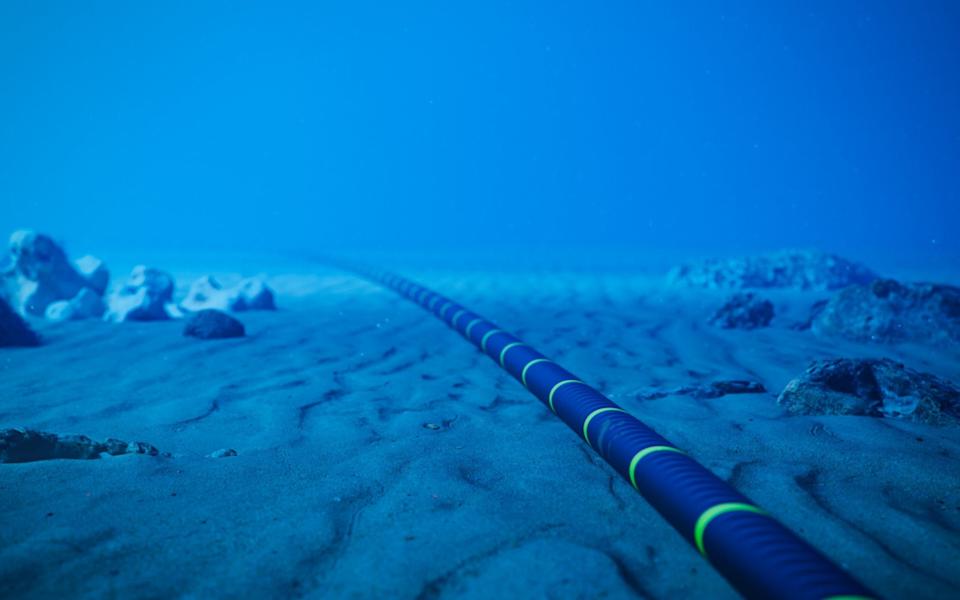A Chinese language ship is suspected of severing two essential web cables within the Baltic Sea in an act of sabotage which will have been orchestrated by Russia.
Investigators consider that the Yi Peng 3, a Chinese language-registered bulk service, intentionally severed the 2 key cables final week by dragging its anchor alongside the Baltic seabed for greater than 100 miles.
The investigation is now targeted on whether or not the captain of the 225-metre-long bulk service was directed to hold out the suspected sabotage by Moscow.
A senior European investigator informed the Wall Avenue Journal: “It’s extraordinarily unlikely that the captain wouldn’t have seen that his ship dropped and dragged its anchor, dropping pace for hours and chopping cables on the best way.”
The incident has prompted concern amongst Western nations that Russia is participating in what the White Home described as “hybrid warfare”, an accusation that the Kremlin denies.
The most recent harm to cables within the Baltic Sea occurred in Swedish waters between Nov 17 and 18, based on the authorities.
The vessel had been making its method from Ust-Luga, in Russia, to Port Stated, in Egypt, by the Baltic Sea, when the incident occurred.
Yi Peng 3 anchored underneath surveillance by a Danish naval patrol vessel within the Kattegat Strait – MIKKEL BERG PEDERSEN/SHUTTERSTOCK
Investigators consider that the majority service’s anchor was purposefully dropped on to the seabed, chopping the 730-mile fibre optic cable C-Lion1 – the one such direct connection between central Europe and Finland – at about 9pm native time on Nov 17.
A second cable was then reduce between Germany and Finland at about 3am the next day after the service travelled about 111 miles, investigators suspect.
Swedish authorities launched an investigation into suspected sabotage earlier than Danish navy ships pursued the Yi Peng 3, forcing it to anchor within the Kattegat Strait.
Since then, the Yi Peng 3 has been surrounded by Nato warships in worldwide waters for every week.
Underneath worldwide maritime regulation, the Nato ships can’t power the vessel to sail to one in every of their ports, so Swedish and German authorities are understood to be negotiating with the vessel’s proprietor.
They hope to acquire entry to the vessel and query its crew over the suspected sabotage.
Western officers don’t consider that Beijing was behind the incident however suspect that Russian intelligence businesses orchestrated the incident, which the Kremlin denies.
A Kremlin spokesman stated: “These are absurd, unsubstantiated accusations.”
One of many cables that was reduce was the 730-mile fibre optic cable C-Lion1 – imaginima/iStockphoto
Tensions have mounted across the Baltic Sea since Russia invaded Ukraine in February 2022.
Months after the invasion a sequence of underwater explosions ruptured the Nord Stream pipelines that transported Russian gasoline to Europe.
Western officers initially believed that Russia was behind the blasts however suspicions had been later raised that Ukraine might have been concerned. It has not but been totally established who was behind the suspected sabotage.
In October final yr, an undersea gasoline pipeline between Finland and Estonia was shut down after being broken by Newnew Polar Bear, a Chinese language cargo ship.
Bruno Kahl, the pinnacle of Germany’s overseas intelligence, stated that a rise in these incidents may result in Nato invoking the alliance’s Article 5 mutual defence clause.
He stated: “The rising ramp up of the Russian army means a direct army confrontation with Nato turns into one attainable possibility for the Kremlin.”
In response to the most recent incident, Donald Tusk, the Polish prime minister, known as for a “policing mission” to be established within the Baltic Sea.
Alongside his counterparts from Denmark, Estonia, Finland, Latvia, Norway and Sweden, Mr Tusk informed a press convention: “We share the evaluation of the safety scenario, together with concern for essential infrastructure and strategic sources alongside the Baltic Sea.”
Mr Tusk stated the specialised police power was essential to “counter threats” within the area.
China’s overseas ministry has denied any duty within the matter.
The Telegraph has contacted the proprietor of the vessel for remark.
Broaden your horizons with award-winning British journalism. Strive The Telegraph free for 3 months with limitless entry to our award-winning web site, unique app, money-saving presents and extra.


